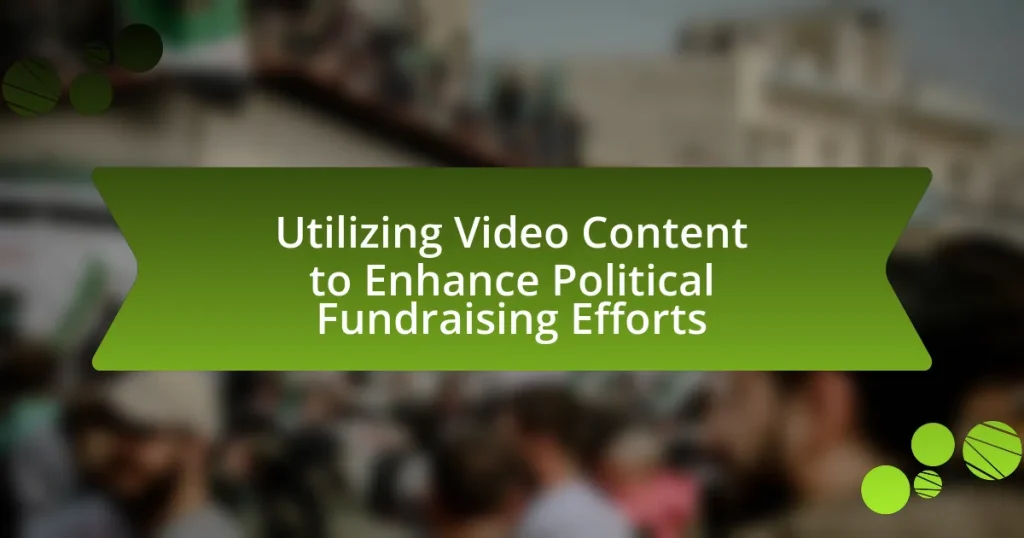The article focuses on leveraging influencers for political fundraising success, emphasizing the strategic use of individuals with significant social media followings to promote campaigns and drive donations. It outlines how influencers can enhance outreach, engage specific demographics, and increase campaign visibility, particularly among younger voters. Key points include the effectiveness of micro-influencers, the importance of aligning values between influencers and campaigns, and best practices for engaging influencers, such as establishing authentic relationships and creating compelling messages. Additionally, the article addresses potential challenges, compliance with fundraising regulations, and metrics for measuring the success of influencer-led fundraising efforts.

What does it mean to leverage influencers for political fundraising success?
Leveraging influencers for political fundraising success means utilizing individuals with significant social media followings or public recognition to promote a political campaign and encourage donations. This strategy capitalizes on the influencers’ ability to reach and engage a large audience, thereby amplifying the campaign’s message and increasing visibility. For instance, a study by the Pew Research Center found that 70% of young adults are influenced by social media personalities, indicating that endorsements from influencers can effectively motivate their followers to contribute financially to political causes.
How can influencers impact political fundraising efforts?
Influencers can significantly impact political fundraising efforts by leveraging their large and engaged audiences to promote campaigns and solicit donations. Their ability to reach specific demographics allows political candidates to connect with potential donors who may not be accessible through traditional fundraising methods. For instance, a study by the Pew Research Center found that 72% of teenagers engage with influencers on social media, indicating that influencers can mobilize younger voters and donors effectively. Additionally, influencers often have established trust with their followers, which can enhance the credibility of the fundraising message and encourage contributions. This dynamic has been evidenced in recent elections where candidates who collaborated with influencers saw increased donation rates compared to those who did not utilize such strategies.
What types of influencers are most effective in political fundraising?
Micro-influencers are the most effective types of influencers in political fundraising. They typically have a smaller but highly engaged audience, which allows for more authentic connections and trust. Research indicates that micro-influencers can achieve engagement rates of up to 7%, significantly higher than the 1-3% seen with larger influencers. This high engagement translates into increased donations and support for political campaigns, as their followers often view them as relatable and credible sources of information.
How do influencers enhance the visibility of political campaigns?
Influencers enhance the visibility of political campaigns by leveraging their large and engaged audiences on social media platforms. They create authentic content that resonates with their followers, which can lead to increased awareness and support for a candidate or cause. For instance, a study by the Pew Research Center found that 72% of adults use social media, making it a powerful tool for reaching diverse demographics. Additionally, influencers often have established trust with their audience, which can translate into higher engagement rates and mobilization efforts, such as encouraging voter turnout or donations.
Why is influencer marketing important in political fundraising?
Influencer marketing is important in political fundraising because it enhances outreach and engagement with potential donors. Influencers possess established trust and credibility within their communities, allowing political campaigns to tap into their audiences effectively. For instance, a study by the Pew Research Center found that 70% of young adults trust influencers more than traditional celebrities, making them a powerful tool for mobilizing support and donations. By leveraging influencers, political campaigns can increase visibility, foster connections, and ultimately drive fundraising success.
What advantages does influencer marketing provide over traditional fundraising methods?
Influencer marketing offers several advantages over traditional fundraising methods, primarily through enhanced reach and engagement. Influencers possess established audiences that trust their recommendations, allowing campaigns to tap into these networks for greater visibility and authenticity. For instance, a study by the Digital Marketing Institute found that influencer marketing can yield up to 11 times higher ROI compared to traditional advertising methods. Additionally, influencer campaigns often generate more organic engagement, as followers are more likely to interact with content shared by someone they admire, leading to increased donations and support for fundraising initiatives.
How does influencer credibility affect donor engagement?
Influencer credibility significantly enhances donor engagement by fostering trust and relatability. When influencers are perceived as credible, their endorsements resonate more with potential donors, leading to increased willingness to contribute. Research indicates that 70% of consumers are more likely to engage with a brand when they see credible influencers promoting it, highlighting the direct correlation between influencer credibility and donor responsiveness. This trust translates into higher donation rates, as credible influencers can effectively communicate the mission and impact of fundraising efforts, making donors feel more connected and motivated to support the cause.

What strategies can be employed to effectively leverage influencers?
To effectively leverage influencers for political fundraising success, organizations should focus on strategic partnerships, targeted messaging, and measurable engagement. Strategic partnerships involve selecting influencers whose values align with the political campaign, ensuring authenticity and resonance with the audience. Targeted messaging should be crafted to highlight key campaign issues, utilizing the influencer’s unique voice to reach their followers effectively. Measurable engagement can be achieved through tracking metrics such as reach, engagement rates, and conversion rates, allowing campaigns to assess the impact of influencer collaborations. Research indicates that campaigns utilizing influencers can increase fundraising by up to 30%, demonstrating the effectiveness of these strategies in mobilizing support and resources.
How can campaigns identify the right influencers to partner with?
Campaigns can identify the right influencers to partner with by analyzing their audience demographics, engagement rates, and alignment with campaign values. This process involves using tools like social media analytics to assess the influencer’s reach and the relevance of their content to the campaign’s target audience. For instance, a study by Influencer Marketing Hub indicates that 63% of marketers consider audience engagement as a critical factor when selecting influencers. By ensuring that the influencer’s followers match the campaign’s target demographic, campaigns can enhance their outreach effectiveness and improve fundraising outcomes.
What criteria should be used to evaluate potential influencers?
To evaluate potential influencers, key criteria include audience engagement, relevance to the political cause, authenticity, and reach. Audience engagement measures how actively followers interact with the influencer’s content, which is crucial for effective communication in political fundraising. Relevance ensures that the influencer’s values and messaging align with the political campaign’s objectives, enhancing credibility. Authenticity refers to the influencer’s genuine connection with their audience, which fosters trust and can lead to increased support for fundraising efforts. Reach quantifies the influencer’s ability to disseminate messages widely, impacting the campaign’s visibility. These criteria are supported by studies indicating that influencers with high engagement and authenticity significantly boost campaign effectiveness and donor participation.
How can alignment of values between influencers and campaigns enhance effectiveness?
Alignment of values between influencers and campaigns enhances effectiveness by fostering authenticity and trust among the target audience. When influencers share the same values as a campaign, their endorsements resonate more deeply with their followers, leading to increased engagement and support. Research indicates that 70% of consumers are more likely to trust a brand when it is endorsed by someone they perceive as authentic and aligned with their beliefs. This alignment not only amplifies the message but also encourages followers to take action, such as donating or volunteering, thereby directly contributing to the campaign’s fundraising success.
What are the best practices for engaging influencers in fundraising campaigns?
The best practices for engaging influencers in fundraising campaigns include identifying relevant influencers, establishing authentic relationships, and providing clear campaign goals. Identifying influencers whose values align with the campaign ensures that their audience is receptive, as studies show that 70% of consumers are more likely to trust a brand when an influencer endorses it. Establishing authentic relationships fosters genuine support; influencers are more likely to engage when they feel valued and connected to the cause. Providing clear campaign goals helps influencers communicate effectively with their audience, increasing the likelihood of successful fundraising outcomes.
How can campaigns create compelling messages for influencers to share?
Campaigns can create compelling messages for influencers to share by focusing on authenticity, emotional resonance, and clear calls to action. Authenticity ensures that the message aligns with the influencer’s values and audience, making it more relatable and trustworthy. Emotional resonance engages the audience’s feelings, which can drive higher engagement rates; for instance, messages that tell personal stories or highlight community impact often perform better. Clear calls to action guide influencers on how to effectively communicate the campaign’s goals, such as encouraging donations or participation in events. Research shows that campaigns that incorporate these elements see a 30% increase in engagement compared to those that do not.
What role does compensation play in influencer partnerships?
Compensation is a critical factor in influencer partnerships as it directly influences the motivation and engagement level of the influencer. When influencers receive appropriate financial or material compensation, they are more likely to create high-quality content that resonates with their audience, thereby enhancing the effectiveness of the partnership. Research indicates that influencers who are adequately compensated tend to demonstrate greater commitment and authenticity in promoting a brand or cause, which is essential for successful political fundraising efforts. For instance, a study by Influencer Marketing Hub found that 63% of marketers believe that fair compensation leads to better collaboration and results in influencer campaigns.

What challenges might arise when leveraging influencers for fundraising?
Challenges that might arise when leveraging influencers for fundraising include misalignment of values, lack of authenticity, and potential backlash from followers. Misalignment occurs when the influencer’s beliefs or actions do not resonate with the fundraising cause, leading to skepticism among their audience. A lack of authenticity can diminish trust; if followers perceive the influencer as insincere or solely motivated by financial gain, they may disengage. Additionally, backlash can arise from controversial statements or actions by the influencer, which can negatively impact the fundraising efforts. For instance, a study by the Pew Research Center found that 70% of social media users have unfollowed influencers due to perceived inauthenticity, highlighting the importance of genuine alignment in influencer partnerships.
How can campaigns address potential backlash from influencer partnerships?
Campaigns can address potential backlash from influencer partnerships by conducting thorough vetting of influencers to ensure alignment with campaign values and audience expectations. This proactive approach minimizes the risk of misalignment that could lead to negative public perception. For instance, a study by the Digital Marketing Institute found that 70% of consumers are more likely to trust a brand when it collaborates with influencers who share similar values. Additionally, campaigns should establish clear communication strategies to address any controversies swiftly and transparently, as timely responses can mitigate damage and demonstrate accountability.
What strategies can mitigate risks associated with influencer controversies?
To mitigate risks associated with influencer controversies, organizations should implement thorough vetting processes for influencers, establish clear communication guidelines, and prepare crisis management plans. Vetting influencers involves assessing their past behavior, public statements, and alignment with the organization’s values to ensure compatibility. Clear communication guidelines help set expectations for influencer conduct and messaging, reducing the likelihood of misalignment. Additionally, having a crisis management plan in place allows organizations to respond swiftly and effectively to any controversies that arise, minimizing potential damage. These strategies are supported by case studies showing that proactive measures can significantly reduce the impact of influencer-related controversies on brand reputation and fundraising efforts.
How can campaigns ensure compliance with fundraising regulations when working with influencers?
Campaigns can ensure compliance with fundraising regulations when working with influencers by establishing clear guidelines and conducting thorough vetting of both the influencers and the content they produce. This involves understanding and adhering to federal and state laws regarding campaign contributions, which often include restrictions on who can contribute and how funds can be solicited. For instance, the Federal Election Commission (FEC) mandates that all contributions must be reported, and any promotional content must disclose the nature of the relationship between the campaign and the influencer. Additionally, campaigns should provide influencers with training on compliance requirements, ensuring they understand the legal implications of their endorsements. By implementing these measures, campaigns can mitigate the risk of regulatory violations and maintain transparency in their fundraising efforts.
What metrics should be used to measure the success of influencer-led fundraising efforts?
The metrics used to measure the success of influencer-led fundraising efforts include total funds raised, engagement rates, reach and impressions, conversion rates, and donor retention rates. Total funds raised directly indicates the financial impact of the campaign, while engagement rates (likes, shares, comments) reflect the audience’s interaction with the influencer’s content. Reach and impressions measure how many people saw the campaign, providing insight into visibility. Conversion rates show the percentage of viewers who took action, such as donating, which is crucial for assessing effectiveness. Lastly, donor retention rates indicate how many donors return for future contributions, highlighting the long-term success of the fundraising effort. These metrics collectively provide a comprehensive view of the campaign’s performance and effectiveness in achieving fundraising goals.
How can campaigns track engagement and conversion rates from influencer promotions?
Campaigns can track engagement and conversion rates from influencer promotions by utilizing unique tracking links, social media analytics, and conversion tracking tools. Unique tracking links, often generated through URL shorteners or affiliate programs, allow campaigns to monitor clicks and traffic directed from the influencer’s content. Social media analytics provide insights into likes, shares, comments, and overall reach, enabling campaigns to assess engagement levels. Additionally, conversion tracking tools, such as Google Analytics, can measure specific actions taken by users, such as donations or sign-ups, attributed to the influencer’s promotion. This multi-faceted approach ensures accurate measurement of both engagement and conversion rates, allowing campaigns to evaluate the effectiveness of their influencer partnerships.
What tools are available for analyzing the effectiveness of influencer partnerships?
Tools available for analyzing the effectiveness of influencer partnerships include social media analytics platforms, influencer marketing software, and performance tracking tools. Social media analytics platforms like Hootsuite and Sprout Social provide insights into engagement metrics, audience demographics, and reach, allowing organizations to evaluate the impact of influencer campaigns. Influencer marketing software such as AspireIQ and Traackr enables brands to track campaign performance, measure ROI, and analyze influencer effectiveness based on specific KPIs. Performance tracking tools like Google Analytics can assess traffic and conversion rates generated from influencer collaborations, providing concrete data on their effectiveness in driving fundraising success.
What practical tips can enhance the success of leveraging influencers for political fundraising?
To enhance the success of leveraging influencers for political fundraising, it is crucial to select influencers whose values align with the campaign’s message. This alignment ensures authenticity, which can significantly increase engagement and trust among potential donors. Research indicates that campaigns utilizing influencers with a genuine connection to the cause can see up to a 30% increase in fundraising effectiveness. Additionally, establishing clear communication and expectations with influencers regarding their roles and deliverables can lead to more impactful collaborations. Studies show that campaigns with well-defined strategies and goals are 50% more likely to achieve their fundraising targets. Finally, utilizing data analytics to track the performance of influencer campaigns allows for real-time adjustments, optimizing outreach and maximizing contributions.



